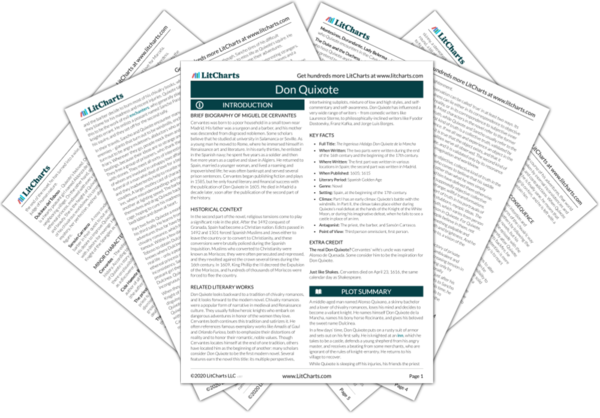For Quixote, gaps between intention and consequence mark the failures of the chivalric way of life. Quixote tries to help others by following the elaborate conventions outlined in chivalry novels, but his efforts often backfire – most obviously in the episode with the shepherd boy, who is beaten even more severely after Quixote intervenes. The first few times Quixote’s efforts backfire, he defends his actions by claiming, in effect, that intention is more important than consequence – that a knight’s duty is to react courageously, not to judge precisely.
But as negative consequences pile up, Quixote begins to alter his reasoning. When he observes that appearances can be deceitful, he acknowledges that a person has a responsibility to look past the traps and illusions of appearance to a more solid foundation of truth. If appearances can be deceitful, then a knight should not act impulsively because someone or something looks sinister – he must dig deeper to identify the most ethical course of action. This is a difficult task, and by the end of the novel it seems to overwhelm Quixote. He despairs to see that each event is a tangled ball of motives and desires, to realize that his chivalry rulebook is not an adequate guide to the world, after all.
Intention and Consequence ThemeTracker

Intention and Consequence Quotes in Don Quixote
And to what can my barren and ill-cultivated mind give birth except the history of a dry, shriveled child, whimsical and full of extravagant fancies that nobody else has ever imagined – a child born, after all, in prison, where every discomfort has its seat and every dismal sound its habitation?
There is no reason why someone with a plebeian name should not be a knight, for every man is the child of his own deeds.
It is not the responsibility of knights errant to discover whether the afflicted, the enchained, and the oppressed whom they encounter on the road are reduced to these circumstances and suffer their distress for the vices, or for their virtues: the knight’s sole responsibility is to succor them as people in need, having eyes only for their sufferings, not for their misdeeds.
…he sometimes thought [Quixote] sane and sometimes mad, because what he said was coherent, elegant and well expressed, and what he did was absurd, foolhardy and stupid.
My intentions are always directed towards worthy ends, that is to say to do good to all and harm nobody; and whether the man who believes this, puts it into practice and devotes his life to it deserves to be called a fool is something for Your Graces, most excellent Duke and Duchess, to determine.











